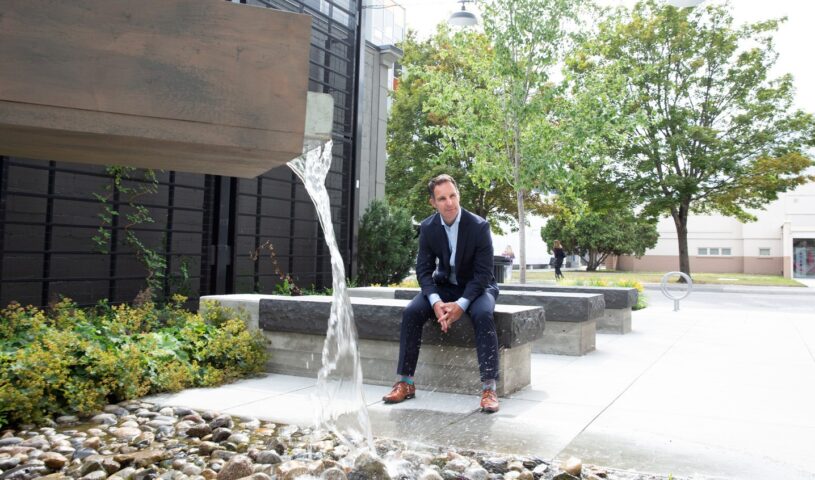Four climate action lessons from Canada’s first net-zero-by-2030 municipality

Halton Hills is a fast-growing town with big climate ambition. In 2019, town council set the most ambitious climate action target of any community in Canada: to achieve net-zero community greenhouse gas emissions by 2030. While global climate leaders like Glasgow, Scotland; Ithaca, New York; and Bristol, England have recently set similar targets, Halton Hills’ level of ambition is unique among Canadian governments.
In 2020, the town hired Sustainability Solutions Group (SSG) to develop an evidence-based and community-informed pathway to reach its goal. Shortly after, the town unanimously adopted the Low-Carbon Transition Strategy. The following lessons learned can help other communities looking to undertake bold climate action.
1. Climate Change Must Be an Organizational Priority
In 2019, the town restructured its organization in response to the climate emergency. It merged its Office of Sustainability and Asset Management Division to create a new Climate Change and Asset Management Division (CCAM) reporting to the CAO’s Office. The merger ensures an integrated approach, aligning investments in buildings and fleet with the net-zero emissions goal.
The town also hired new staff: one dedicated to climate, one to corporate energy management, and one to asset management. These members added to the town’s existing staff to create a team of five committed to climate issues, one of whom was dedicated to completing the Low-Carbon Transition Strategy. For its size, dedicating so many staff to climate change work is significant.
Additionally, the town created a corporate Climate Change Action Task Force – which includes the town’s CAO, mayor, councillors, senior staff members, and the CCAM manager – to oversee the climate file. Finally, a Low-Carbon Transition Steering Committee, chaired by a member of council and including staff and community stakeholders, oversaw the development of the community-wide Low-Carbon Transition Strategy.
The restructuring and integration of climate change at the highest levels of the organization helped create a culture that prioritizes climate action across the entire corporation. As a result, despite the challenges of working on the strategy and an extensive engagement process during the pandemic, progress was smooth and nearly on schedule.
2. It’s Critical to Get the Community on Board from the Start
To develop the strategy, the town undertook deep engagement with its Multi-Stakeholder Governance Committee (MSGC), made up of representatives from the community, utilities, businesses, institutions, non-profits, and public agencies. The engagement aimed to ensure the strategy reflected the community’s context and to enable the town to implement it as soon as possible.
An MSGC Data Subcommittee focused on whether the data and assumptions used in the energy and emissions model that formed the basis of the net-zero pathway were technically accurate. An Implementation Subcommittee identified who would oversee the strategies’ implementation and key projects the town could start working on while the strategy was in development. The town’s “plan while doing” approach to implementation led to MSGC members initiating:
- an electric vehicle (EV) education day (hopefully the first of many);
- a working group on criteria for identifying ground mount solar installation sites; and
- a commercial fleet electrification support program.
Many other projects were considered, refined, and either postponed or rejected – all of which helped the town understand potential solutions while preparing it to hit the ground running in 2022. The engagement laid the groundwork for public-private community-wide partnerships, which are critical to achieving carbon neutrality.
3. Council Needs to Be Informed and Involved Throughout the Process
Educating councillors so that they understand the major changes required to achieve their targets while providing opportunities to raise questions or concerns.
Staff gave council regular updates on the strategy’s progress. In addition, the mayor chaired the corporate task force and a councillor chaired the Low-Carbon Transition Steering Committee. Council members were also invited to a public education workshop on the strategy early in its development. Finally, city staff and SSG gave council an in-depth educational workshop on the strategy a month before it was put before them for approval.
4. Don’t Let Perfection Be the Enemy of the Good
Despite facing a practical challenge of how to eliminate a significant percentage of its vehicle emissions by 2030, the town unanimously committed to moving forward. For now, the town knows that it can reduce 74 percent of its emissions through a commitment to:
- mass deep energy-efficiency retrofits and fuel switching in its buildings and industry;
- reduce the need for personal vehicle trips by increasing access to walking, cycling, and scootering infrastructure, as well as emissions-free travel options like carshares and buses;
- promote quick adoption of EVs through expansion of EV charging stations, EV-ready buildings, and EV awareness; and
- expand the community’s natural sequestration capacity via tree planting, natural assets management, soil health programs, and limiting urban sprawl.
Unfortunately, even the boldest policies make it difficult to retire thousands of combustion engine vehicles already on the road. For now, the town is committed to reducing those emissions it knows it can while continuing to consider solutions to address the more stubborn vehicle emissions.
The town is backing their net-zero-by-2030 target with:
- significant staffing;
- deep community and council engagement; and
- willingness to move forward despite some challenging emissions sources.
The Town of Halton Hills is taking some of the boldest climate action in Canada, and the Low-Carbon Transition Strategy will be the critical roadmap guiding the town on its pathway. MW
✯ Municipal World Insider and Executive Members: You might also be interested in Ashley Thompson’s article: Small municipality goes big with Green Municipal Campus.
Michael Dean is the Towns’ Senior Climate Change and Energy Planner.
Kyra Bell Pasht is a sustainability consultant and a Senior Associate at Sustainability Solutions Group.
Together, they oversaw the development of the Halton Hills Low-Carbon Transition Strategy.
Related resource materials:



